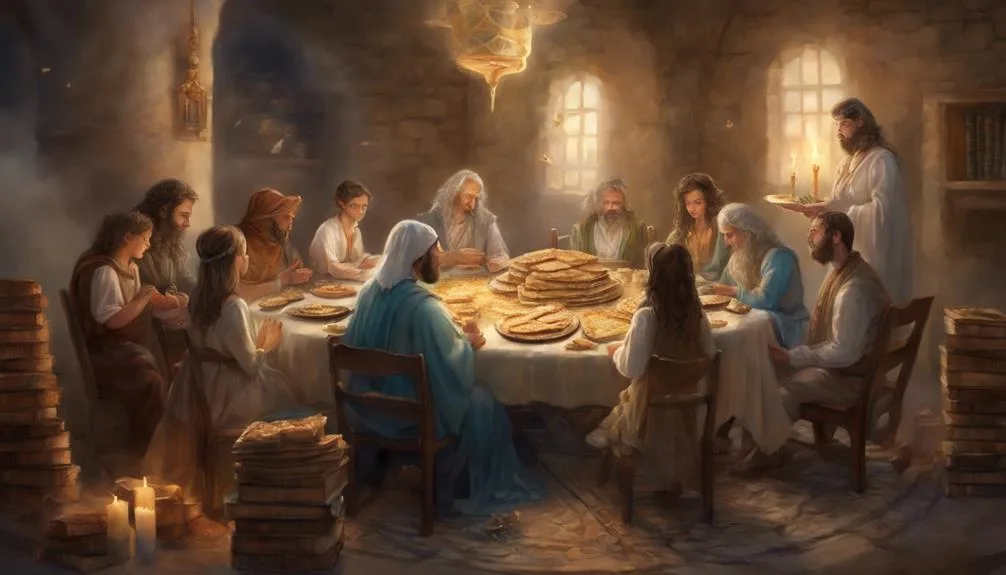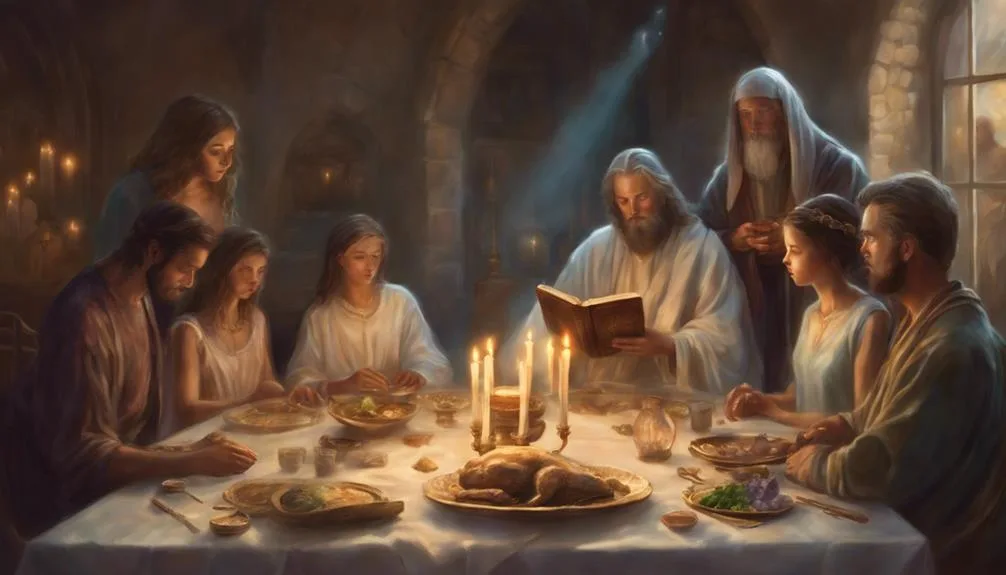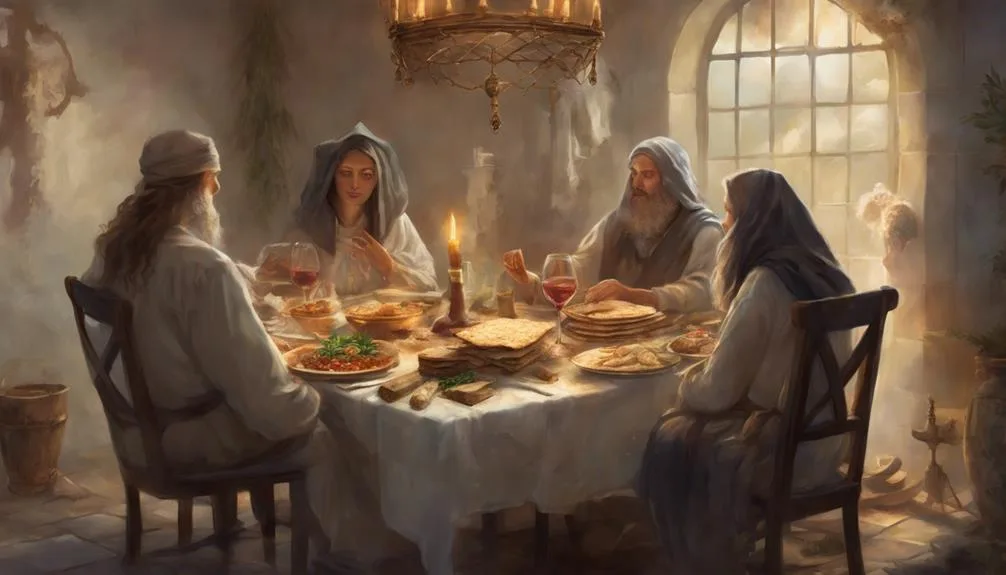If you're a Christian interested in celebrating Passover, you'll find its deep history and symbols can greatly enrich your faith. By exploring how Passover connects the Old Testament with the New Testament, you can gain a better understanding of your beliefs.
This look into Passover offers an opportunity to see how ancient traditions can illuminate the Christian faith, providing a meaningful way to reflect on your spiritual journey.
Key Takeaways
- Participate in a Seder meal to experience Passover symbolism firsthand.
- Embrace Passover traditions to strengthen the connection between Judaism and Christianity.
- Reflect on the spiritual significance of Passover in relation to Christian faith.
- Engage in Seder customs to deepen understanding of Jesus' sacrifice and redemption.
Significance of Passover for Christians
Understanding the significance of Passover for Christians can deepen your appreciation for the historical and spiritual connections it holds for the faith. Passover isn't only a significant Jewish holiday but also holds immense importance in Christian origins. The spiritual connection between Passover and Christianity is profound, as it symbolizes the freedom from sin and bondage through the sacrifice and resurrection of Jesus Christ.
In Christian origins, Passover marked the Last Supper, where Jesus shared the Passover meal with his disciples before his crucifixion. This event is commemorated in the Christian faith through the sacrament of Holy Communion, emphasizing the spiritual connection between Passover and the sacrifice of Jesus for the redemption of humanity.
Incorporating Passover Traditions
To incorporate Passover traditions into your Christian observance, consider participating in a Seder meal to experience the rich symbolism and historical significance firsthand. Embracing these traditions can deepen your understanding of the roots of your faith and strengthen your connection to the shared heritage of Judaism and Christianity.
Here are some ways to incorporate Passover traditions:
- Family Traditions: Invite your loved ones to join you in celebrating Passover, emphasizing the importance of family unity and the passing down of beliefs from generation to generation.
- Spiritual Connections: Reflect on the spiritual parallels between the Passover story and the Christian faith, recognizing how the themes of redemption and freedom resonate across both traditions.
- Symbolic Foods: Explore the meaning behind traditional Passover foods like matzah, bitter herbs, and the Passover lamb, connecting them to Christian beliefs and practices.
- Haggadah Readings: Engage in the readings and rituals of the Haggadah, the guidebook for the Seder meal, to delve deeper into the story of Passover and its relevance to your Christian walk.
Christian Perspective on Passover Seder

For Christians, embracing the Passover Seder tradition can offer a profound opportunity for spiritual growth and connection to the shared heritage of Judaism and Christianity. Participating in a Seder allows for Christian reflection on the significance of the Exodus story, deepening one's understanding of God's faithfulness and deliverance.
As you engage in the Seder customs, such as the retelling of the plagues or the partaking of the symbolic foods, consider how these traditions can enrich your faith journey. The Seder plate, with its various elements like bitter herbs and matzah, can serve as tangible reminders of God's presence and provision throughout history.
Approaching the Passover Seder with a Christian perspective involves appreciating the parallels between the Passover story and the ultimate sacrifice of Jesus Christ. Recognize the themes of liberation, redemption, and the passing over of sin present in both traditions.
Symbolism in Passover Celebrations
Exploring the rich symbolism interwoven within Passover celebrations can deepen your appreciation for the profound meanings behind each ritual and tradition. Here are some insights into the symbolic meanings and ritual practices that make Passover a significant and meaningful celebration for Christians:
- Matzah: The unleavened bread symbolizes the Israelites' haste in leaving Egypt, reminding us of God's faithfulness and protection during times of urgency.
- Bitter Herbs: These represent the bitterness of slavery, prompting reflection on the hardships faced by the Israelites and the importance of freedom and redemption.
- Egg: Often seen as a symbol of renewal and new life, the egg signifies the hope and new beginnings that come with God's deliverance.
- Wine: The four cups of wine symbolize the promises of God to the Israelites – to bring them out of Egypt, deliver them from slavery, redeem them, and take them as His people.
Commemorating Passover With Faith

As you commemorate Passover with faith, you can reflect on the profound symbolism and traditions that enrich this meaningful celebration. It is a time for faithful reflection and a spiritual journey that connects you to the roots of your faith. Embracing the significance of Passover can deepen your understanding of God's deliverance and the covenant relationship between God and His people.
To guide you in commemorating Passover with faith, consider the following elements:
| Commemorating Passover With Faith | Guidance |
|---|---|
| 1. Seder Plate | Arrange the symbolic foods on the plate, each representing a part of the Exodus story. |
| 2. Haggadah Reading | Engage in the Haggadah reading to recount the story of the Israelites' liberation. |
| 3. Matzah | Reflect on the unleavened bread as a symbol of humility and haste in leaving Egypt. |
| 4. Four Cups of Wine | Drink each cup, symbolizing different aspects of freedom and redemption. |
| 5. Elijah's Chair | Leave a seat empty for Elijah, symbolizing hope and the coming of the Messiah. |
Embrace this spiritual journey with an open heart, allowing the traditions of Passover to illuminate your faith and strengthen your connection to God.
Conclusion
Embracing Passover traditions as a Christian can offer a profound connection to our faith's roots, enhancing our spiritual journey.
By participating in a Seder and honoring this significant holiday, we not only commemorate our shared history but also enrich our relationship with God.
This act of reverence invites us to reflect on the enduring impact of ancient traditions in our lives today.
How might this deeper understanding shape our faith moving forward?
Let's cherish this opportunity to connect with our heritage, recognizing its lasting influence on our spiritual path.

